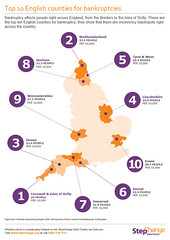Anything leading you to going through bankruptcy is not a happy tale, but the life you live after might be. The whole point is to wipe the slate clean and have a new chance at life. This article will show you how you can make the best of bankruptcy rather than dwelling on the circumstances that got you there in the first place.
If you owe money on taxes, don’t look at bankruptcy as a way to avoid paying. Some filers pay the taxes that they owe with credit cards and then they file for bankruptcy. The reason for doing this is that they assume that it is possible to avoid paying taxes because the balance is in the form of a credit card balance. But, this is already covered by bankruptcy law, so you will simply end up owing both.
Choose a bankruptcy attorney carefully. Bankruptcy law seems to be a haven for new, inexperienced attorneys. Be sure the attorney you retain has at least five years of experience and is board certified. Use the Internet to look at lawyer’s disciplinary records, background, and client ratings.
Choose the best bankruptcy attorney in your area. When you have located a good lawyer, be sure to find out whether or not the initial consultation is free. Take all financial information when going to a consultation. A qualified attorney can help you understand the bankruptcy process.
People generally mostly feel the need to get a bankruptcy filed for when they have more money owed than they can get. Study the laws in you state to learn what you need to do and what your options are. Most states differ in their laws governing bankruptcy. Your home and other major assets may be protected in your state, while they are vulnerable in other states. You should be familiar with the laws for your state before filing for bankruptcy.
Before making your decision to file for bankruptcy, double-check to see if other, less drastic options could make sense. For example, consumer credit counseling programs can help if your debt isn’t too large. It is also possible to do your own debt negotiations; however, be sure to get everything in writing.
Before you file for personal bankruptcy, be sure that you are cognizant of all current laws. It can be tough to keep up with them on your own, and because they change often, a bankruptcy attorney can help you keep track for the sake of your filing process. Your state’s legislative offices or website will have up-to-date information about these changes.
You should not let your bankruptcy lawyer take complete charge of your case. While your lawyer does have the bankruptcy information, it is still up to you to find out everything you can that will be helpful. It might feel nice to leave everything to your attorney in the short run, but doing so could have long-term financial consequences.
If you file for Chapter 7 bankruptcy, do not assume that your debts will just be dismissed. Some secured debts may need to be reaffirmed, which means you have to draft a new agreement for repaying them, and some debts aren’t dischargeable under most circumstances. Some debts that aren’t dischargeable include child support, student loans, and alimony.
You should weigh every option before thinking about bankruptcy. Find out if you can receive a reduced interest rate or altered repayment plan instead of bankruptcy filing. Loan modification can help you get out of foreclosure. Your lender can help you get current on your loan by offering you one of a number of modifications, such as getting rid of late charges, lowering interest rates, or extending the length of the loan. When all is said and done, the creditors want their money, so sometimes it’s best to deal with a repayment plan than with a bankruptcy debtor.
As said previously, a situation leading to bankruptcy can be upsetting. Use what you have learned and take responsibility for your financial health – turn your life around. Actually, by using the advice you’ve learned here, your story of hardship could have a happy ending after all!
